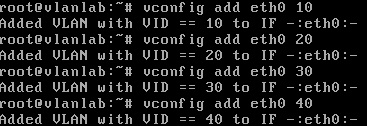Linux VLAN Trunking: Difference between revisions
Jump to navigation
Jump to search
(Created page with '=Basic VLAN Trunking in Debian based Linux.= ==Goals of Lab== *Enable 802.1Q Tagging *Create Virtual Interfaces == Scenario == middle ==Step 1== The f…') |
(→Step 4) |
||
| (29 intermediate revisions by the same user not shown) | |||
| Line 1: | Line 1: | ||
=Basic VLAN Trunking | =Basic VLAN Trunking for Linux.= | ||
;Goals<nowiki>:</nowiki> | |||
*Create sub-interfaces with VLAN tagging enabled | |||
*Create | |||
== Scenario == | == Scenario == | ||
| Line 9: | Line 8: | ||
==Step 1== | ==Step 1== | ||
The first thing you'll want to do is install the VLAN package using aptitude. | The first thing you'll want to do is install the VLAN package using aptitude. | ||
: | :aptitude install vlan | ||
:[[File:Installvlan.jpg|middle]] | :[[File:Installvlan.jpg|middle]] | ||
Note: if aptitude can't find the package, use the command "aptitude update" before trying to install the package. | Note: if aptitude can't find the package, use the command "aptitude update" before trying to install the package. | ||
==Step 2== | ==Step 2== | ||
Load the | Load the 802.1Q module into the kernel | ||
: | :modprobe 8021q | ||
Then verify the module has been loaded into the kernel | Then verify the module has been loaded into the kernel | ||
: | :lsmod | grep 8021q | ||
The output on your screen should look similar: | The output on your screen should look similar: | ||
| Line 23: | Line 22: | ||
==Step 3== | ==Step 3== | ||
Use vconfig to add | Use vconfig to add VLANS | ||
:vconfig add "''interface''" "''VLAN''" | |||
:[[File:Vconfig.jpg|middle]] | |||
:VLAN's 10, 20, 30, and 40 are now created (as sub-interfaces), labeled as eth0.10, eth0.20, eth0.30, eth0.40 | |||
==Step 4== | |||
Configure IP Addresses on the VLANS / sub-interfaces. | |||
:ifconfig "''interface''.''VLAN''" "''ip address''" netmask "''subnet mask''" | |||
:[[File:Configvlanip.jpg|middle]] | |||
:<nowiki>*</nowiki>Verify the VLANS / sub-interfaces were added and up by running the ''ifconfig'' command<nowiki>*</nowiki> | |||
==Step 5== | |||
Configure the default gateway (add a route) for each VLAN / sub-interface | |||
:route add -net "''network address''" netmask "''subnet mask''" gw "''default gateway''" | |||
:[[File:Defaultroute.jpg|middle]] | |||
;The server should now be trunking VLANS 10,20,30, and 40 over eth0 | |||
Latest revision as of 15:59, 11 May 2010
Basic VLAN Trunking for Linux.
- Goals:
- Create sub-interfaces with VLAN tagging enabled
Scenario
Step 1
The first thing you'll want to do is install the VLAN package using aptitude.
Note: if aptitude can't find the package, use the command "aptitude update" before trying to install the package.
Step 2
Load the 802.1Q module into the kernel
- modprobe 8021q
Then verify the module has been loaded into the kernel
- lsmod | grep 8021q
The output on your screen should look similar:
Step 3
Use vconfig to add VLANS
- vconfig add "interface" "VLAN"
- VLAN's 10, 20, 30, and 40 are now created (as sub-interfaces), labeled as eth0.10, eth0.20, eth0.30, eth0.40
Step 4
Configure IP Addresses on the VLANS / sub-interfaces.
- ifconfig "interface.VLAN" "ip address" netmask "subnet mask"
- *Verify the VLANS / sub-interfaces were added and up by running the ifconfig command*
Step 5
Configure the default gateway (add a route) for each VLAN / sub-interface
- route add -net "network address" netmask "subnet mask" gw "default gateway"
- The server should now be trunking VLANS 10,20,30, and 40 over eth0




